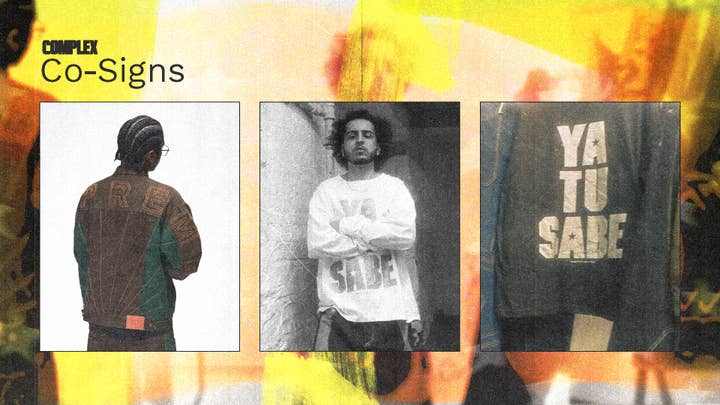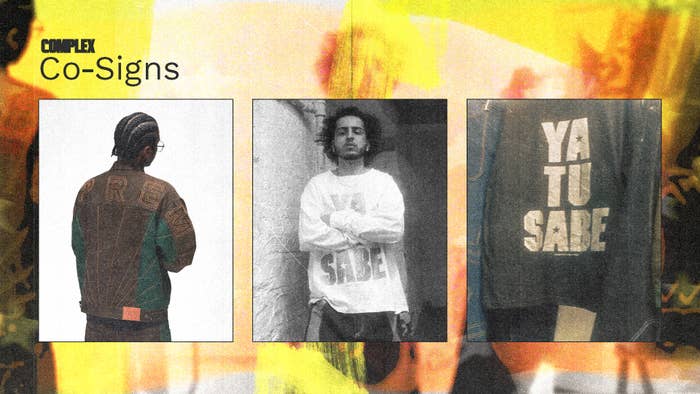
‘Complex Co-Signs’ is a monthly feature that will highlight up-and-coming or under-the-radar creators within the style space that we are personally fans of. Whether you are familiar with them yet or not, these individuals are surely worth keeping up with.
Matthew Valdez’s life as a New York City clothing designer hasn’t changed much since designing pieces for Supreme’s Fall/Winter 2023 collection.
“People were like, ‘You got that Supreme money now.’ I don't got six figures or mad money. I just got enough to live on,” Valdez tells me as he sweeps up fabric scraps in his atelier, a windowless basement studio inside an old factory in Bushwick, Brooklyn. “I've been living off this for two years, and I don't think I could do it the way I am now if I had another job.”
Everyday, Valdez comes here to produce and design pieces for his clothing line YaTuSabe. The label’s name is Spanish for “you already know," and the phrase aptly describes the headnod one might give when wearing the Dominican-Puerto Rican designer’s garments around New York. That’s because Valdez’s label isn’t sold at major stockists. Instead, Valdez has built a cult clientele by handcrafting bespoke denim apparel that he sells for $350–$3,000. Although Valdez has sewn together less than 800 YaTuSabe garments to date, his line is one of the best-kept secrets amongst New York's creative class.
“I'm just trying to give people the feeling of custom, bespoke clothing, because that doesn't exist for people in their 20s,” says the 26-year-old designer. “I want to eventually turn this into a full-fledged brand, but right now the basis of this brand is the people. It's about letting them create with me. If we come up with an idea, I'll make it for you.”
YaTuSabe’s aesthetic, denim embellished by graphics created through top stitch embroidery and appliqués, has resonated with luminaries like Sage Elsesser (a.k.a. Navy Blue), who owns several pairs of his pants. For Juneteenth this year, the emerging Brooklyn artist Aya Brown commissioned Valdez to craft black bottoms embellished with embroidered stars and arched patches in the colors of the Pan-African flag. ASAP Twelvyy recently ordered an airbrushed denim set to wear on the cover of his latest album, Kid’s Gotta Eat. And the genre-bending rapper Pink Siifu, one of YaTuSabe’s most devoted customers, entrusted Valdez to sew him a pink and brown piebald jumpsuit and a purple suit with exaggerated pleated frills. “All he said was ‘I want to look like Prince,’" says Valdez, who designed and produced the purple fit in just four days.
Valdez’s one-man atelier has created enough noise in New York that Supreme’s design team even asked him to submit designs for its Fall/Winter 2023 collection. The result was a spellout denim trucker jacket and baggy jeans, boasting topstitching that resembled sun rays. It’s a look that Valdez says represents the perfected, mass-produced version of his college thesis, which planted the seeds of YaTuSabe in 2019. The collection was titled “Home Sits on the Horizon” and included five looks he designed that bears the top stitch handiwork that he’s known for. He says the stitching for his thesis was inspired by the limestone arched entrance and windows found at the Jamaica Center for Arts and Learning in Queens.
“You know the gates you see when you come into a crib? That's all it was. How the fences or the entrance of spaces in New York City have like a sun ray pattern,” says Valdez as he shows other YaTuSabe designs that resemble the look of cracked sidewalks or arrows found on graffiti pieces. “It's taking things that I see in the city and embodying it. So I saw that as a proper intro because it was like, ‘Welcome to my home.’”
Although music and art came first for Valdez, he says he had aspired to work in the fashion industry since he was a teenager. His earliest introduction to the lucrative business was selling graphic T-shirts (and candy) to friends at his public high school in Queens. He had the foresight to use that money to pay for art classes, which helped him land a big fine arts scholarship at the Parsons School of Design—a school known for producing American fashion talents like Marc Jacobs and Emily Adams Bode Aujla.
“I finessed it by keeping the fine arts scholarship but switching my major to fashion design the first year,” says Valdez. “I didn't come to paint and do all that. I love that stuff, but I really wanted to make clothes.”
Valdez graduated with a BFA in fashion design in 2019, but he says that Parsons only taught him the basics. He credits his aunt, a pattern maker who worked decades in Manhattan’s garment district, for teaching him how to really operate and “get nice” with a sewing machine. He didn’t necessarily land any major gigs while studying at Parsons. The only one he notes is working as an intern for Hood by Air’s last runway show while he was a sophomore. It was only a two-week stint because he got canned. He assumes it was due to smoking weed while working. But Valdez still saw it as a formative experience that cemented exactly what he wanted to do in fashion.
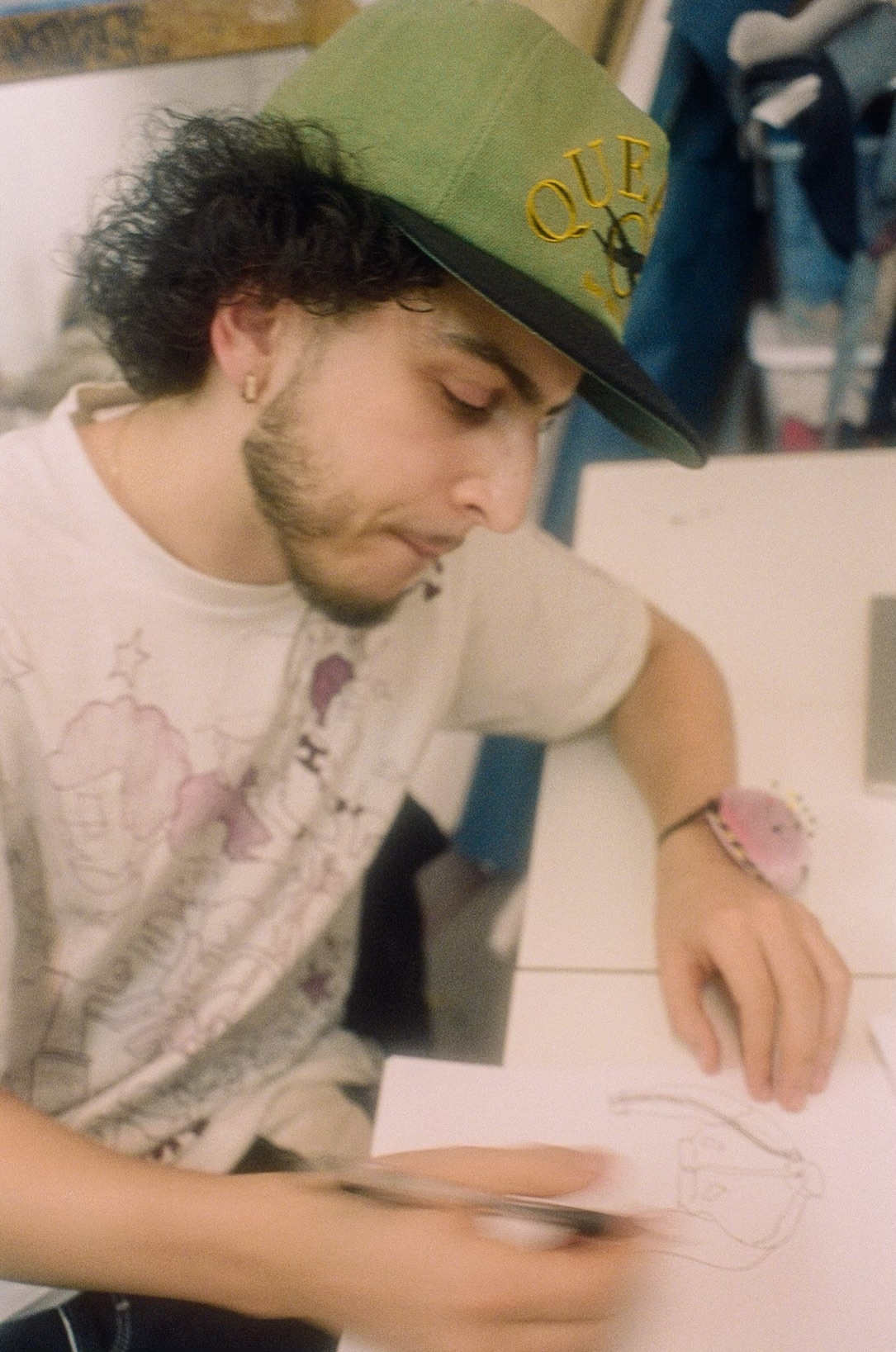
“I remember I saw the pattern makers in another room and this talented girl from my school was working there. That's what I wanted to be on,” says Valdez. “Casting models was fun, and I saw some of the most beautiful people I've ever seen. But I didn't want to just be pinning or hanging stuff up.”
Valdez honed in on the fine skills needed to physically craft garments. He became particularly drawn to the practicality of embellishing garments with top stitched lines or fabric patches. While he noticed most designers utilized topstitching for more minute details on a garment, he saw a larger potential to use it to draw detailed art, shapes, and patterns without outsourcing work to an embroiderer or graphic designer. He’s been committed to this design language since.
“I didn't show nobody my clothes until I literally graduated [Parsons] with my thesis,” says Valdez. “I got YaTuSabe orders right away after I posted my thesis on Instagram. This clothing wasn't even done, and truthfully, poorly made, but we finessed it.”
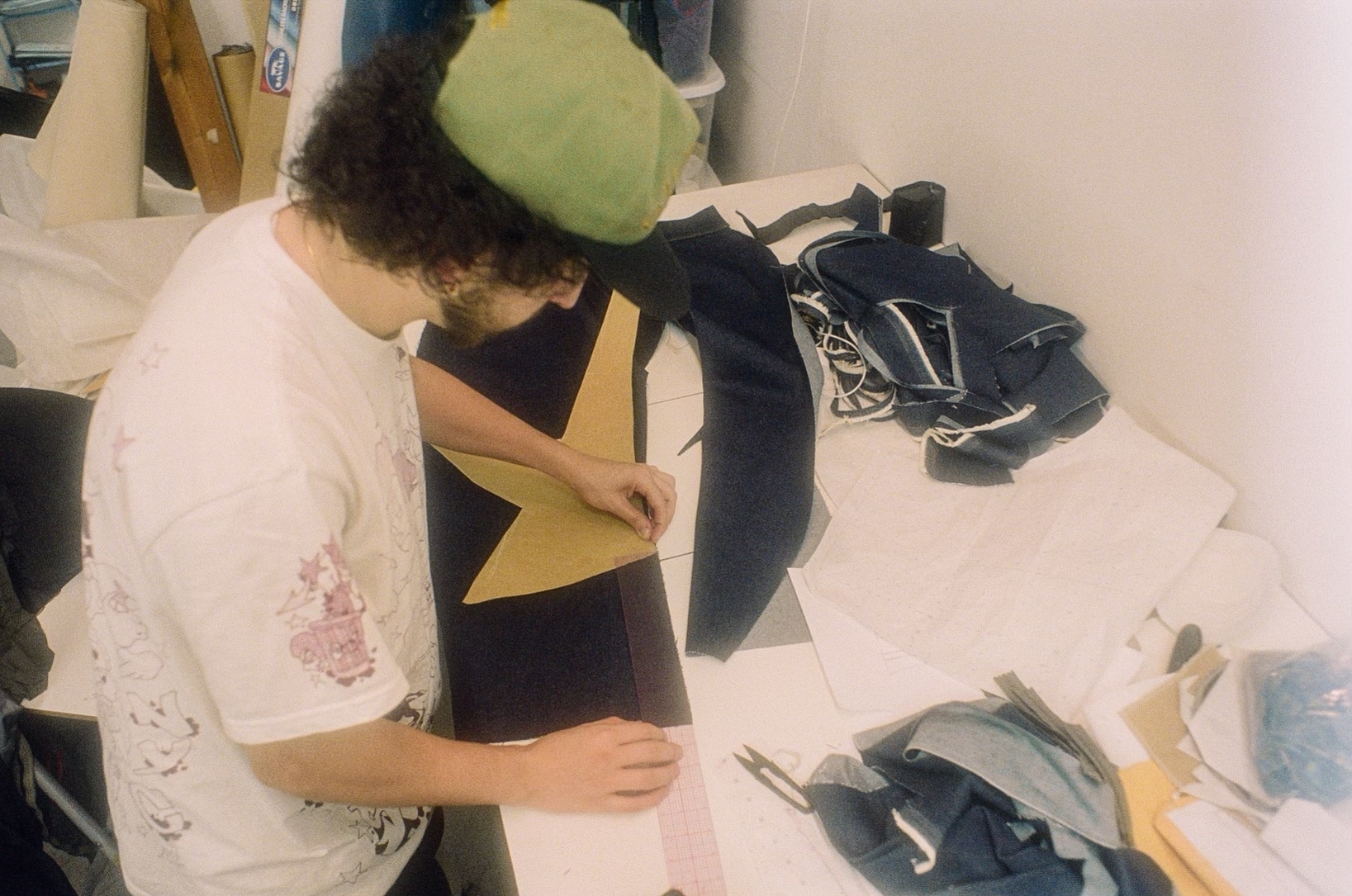
After graduating from Parsons, Valdez began selling YaTuSabe’s wares to friends and creative collaborators he met through making hip-hop beats as “Bori”—Valdez produced “Tired” off Navy Blue’s album Songs of Sage. Like many college graduates, he was living at home with his parents and unsure of where to go next. He sent his portfolio to brands like Awake NY and Luar in the hopes of getting a job, but received no reply. Instead, he focused on music. With the money he made off the first few YaTuSabe orders, he traveled to London with the New York rapper Mike and ended up making an EP with the rapper Goya Gumbani. But YaTuSabe continued to grow through word of mouth.
“It really started to pick up right before COVID hit. I had like 10 order inquiries and was about to be up like three racks,” remembers Valdez. “When I came back from London, COVID hit and it was a wrap. Everybody was like, ‘Fuck those pants,’ and my sewing machine broke. I didn't do shit for almost six months.”
Aside from breaking his sewing machine, Valdez also lost access to his alma mater during COVID, which he relied on for pattern-cutting tables and other design equipment. However, he was determined to persevere by any means necessary. He used the last of his funds to flip some weed so that he could cop a new sewing machine for $550. Eventually, YaTuSabe’s clientele returned. When Kara Walker's daughter (Octavia Bürgel) and artists like Brayan Ramales began buying his wares, his confidence in his brand was restored. He shifted his focus back to fashion.
“Honestly, even though I was focusing on music a lot, I began veering away from it because I always felt like I was living in somebody else's shadow,” shares Valdez. “My friends who make music, they're extremely talented, and I can help make a beat here or there. But no one had this covered. This is what I went to school for, this is my craft, and I have to provide something for the city.”
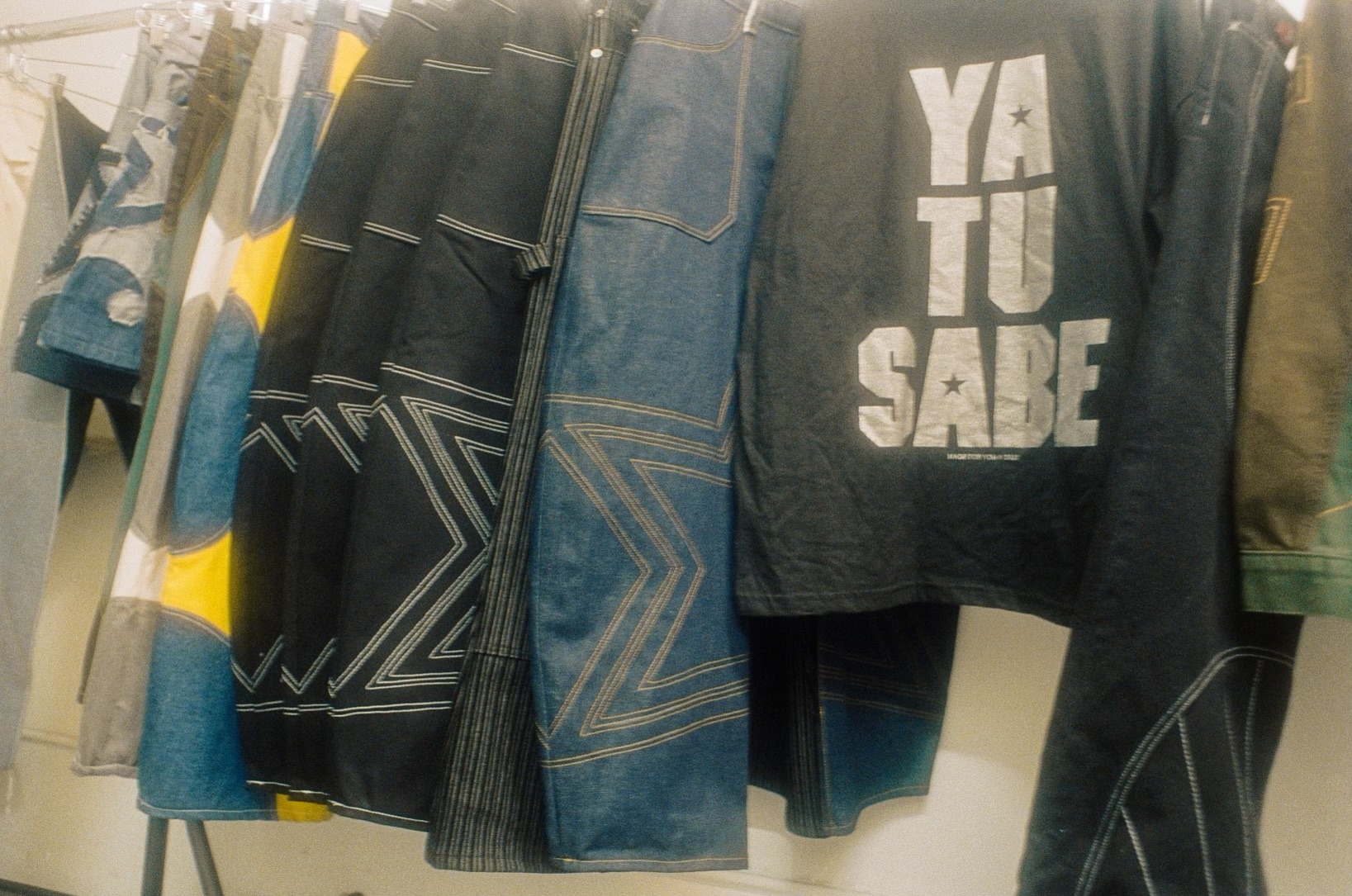
By the end of 2021, YaTuSabe fulfilled around 250 orders. The following year, he fulfilled 250 more and is on pace to do similar numbers this year. While those numbers may seem modest to some, nearly every YaTuSabe piece is handcrafted by Valdez, alone, from start to finish, and takes anywhere from two weeks to several months to finish.
“It's literally a one-man show because I can't have somebody fuck up on my dime and don’t support free labor,” says Valdez. “If you fuck up, and I'm paying you, I'm going to be sick because I need every dollar and I'm not rich at all. So I'll just take the work on.”
Valdez is aware that if he wants to scale YaTuSabe, he would need to hire a proper team and likely outsource his production to factories overseas. He says Supreme has shown him it’s possible to entrust others with producing his look for the mass market. Others have also urged him to grow the label.
“[Corteiz founder] Clint419 visited me down here last September and was just breaking down the numbers. It can get crazy, bro. You can make a lot of money if you find the right factory and pump it the right way,” says Valdez, who vaguely suggests Clint helped Valdez catch Supreme’s attention since he went to meet with the brand right after linking him. “But the ideal thing for me would be hiring a bunch of young kids or seamstresses, teaching them how to make it, fulfill orders in New York City, pay them well, and work in a nice factory that’s mine.”
While Valdez aspires for YaTuSabe to become more financially successful, he emphasizes he wants to achieve that with a holistic approach. He points out that designers in Los Angeles have been able to pay workers fair wages and produce garments hands-on in the United States. And like many Nuyoricans (New Yorkers of Puerto Rican descent) Valdez has a lineage that traces back to the many Puerto Rican garment workers who built the foundation of New York City’s once-robust garment industry. As a designer, he feel’s it’s paramount for him to be able to look into the eyes of the laborers who craft his garments.
“My Puerto Rican grandmother, my grandfather, and all their siblings made clothes in those little sweatshops in Sunset Park, Brooklyn that's known as Industry City today," says Valdez. “I’ll always continue to make crazy bespoke pieces, but I also have concepts and stories written out. I eventually want YaTuSabe to tell the story of my parent's life and my people.”
Valdez emphasizes that personal history isn’t unique to him. He saw his own background being represented when he was hired to build a look for Luar’s Spring/Summer 2024 show in September. Valdez reached out to one of the head designers at Luar to see if they needed any help for the brand’s upcoming runway show. This time, Luar’s team actually replied and asked Valdez to come in and help sew together a denim jacket and skirt look for the runway. Valdez edited and fixed the pattern of the jacket, which bore topstitched accents and beige symmetrical leather parabolic panels that clearly signaled YaTuSabe’s touch. He crafted the jacket in three days and found his brief experience working for Luar founder Raul Lopez, a Dominican, New York–born designer, to be one of the most rewarding experiences he’s had in the industry so far.
“When I was working on that Luar look, I met other designers working there and realized how we're all high-key cut from the same cloth,” remarks Valdez. “This is literally my people, and it's so crazy we're the same age doing this. They’re either just as skilled or even more skilled than me. We still exist in this industry, but it's just in smaller pockets versus how it used to be.”
Valdez believes he is doing the same thing that his ancestors did but on a larger scale. He says he wants to continue crafting denim garments, but is interested in creating more womenswear for YaTuSabe since most of his customers are women. He’s recently been experimenting with what that could look like by crafting knit and silk dresses for his girlfriend that integrate his playful topstitched motifs. Eventually, he foresees YaTuSabe putting together runway shows, hiring pattern makers, and even hiring a team of womenswear designers. But for now, he’s just tightening up what’s already been working for him.
“I remember asking my men’s tailoring teacher, ‘What am I going to do when I get out of school?’ All he said was, ‘You’re going to make clothes and sell them.’ I was like, ‘What?’” Valdez remembers. “It’s funny because, at the time, I didn’t even think that was possible. But he said I had a strong aesthetic and a distinguishable identity. Turns out, that's exactly how it went, and that's how it's been going.”
The Manhattan-based art gallery 'Whaam!' will host YaTuSabe's first-ever pop-up within Chinatown's Elizabeth Center Mall. The pop-up opens on December 15th from 6 p.m. to 8 p.m and will close on January 24th, 2024.
Original Photography by D'Andre Williams

